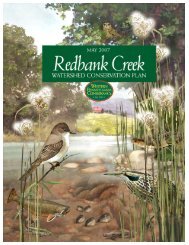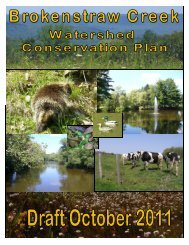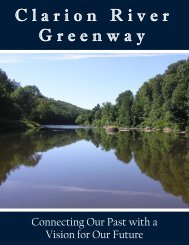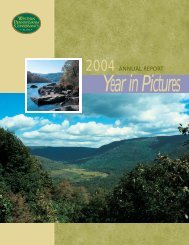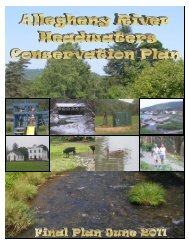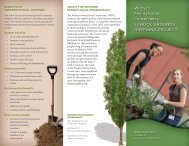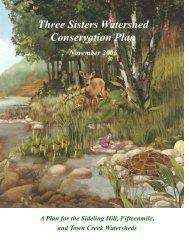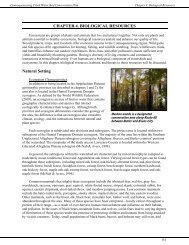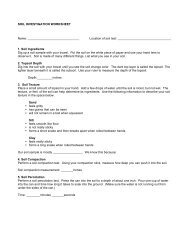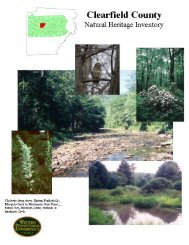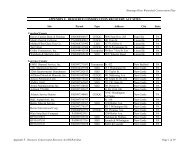- Page 4 and 5:
Connoquenessing Creek Watershed Con
- Page 6 and 7:
Connoquenessing Creek Watershed Con
- Page 8 and 9:
Connoquenessing Creek Watershed Con
- Page 10 and 11:
Connoquenessing Creek Watershed Con
- Page 12 and 13:
Connoquenessing Creek Watershed Con
- Page 14:
Connoquenessing Creek Watershed Con
- Page 18 and 19:
Connoquenessing Creek Watershed Con
- Page 20 and 21:
Connoquenessing Creek Watershed Con
- Page 22 and 23:
Connoquenessing Creek Watershed Con
- Page 24:
Connoquenessing Creek Watershed Con
- Page 27 and 28:
Connoquenessing Creek Watershed Con
- Page 29 and 30:
Connoquenessing Creek Watershed Con
- Page 31 and 32:
Connoquenessing Creek Watershed Con
- Page 33 and 34:
Connoquenessing Creek Watershed Con
- Page 35 and 36:
Connoquenessing Creek Watershed Con
- Page 37 and 38:
Connoquenessing Creek Watershed Con
- Page 39 and 40:
Connoquenessing Creek Watershed Con
- Page 41 and 42:
Connoquenessing Creek Watershed Con
- Page 43 and 44:
Connoquenessing Creek Watershed Con
- Page 45 and 46:
Connoquenessing Creek Watershed Con
- Page 47 and 48:
Connoquenessing Creek Watershed Con
- Page 49 and 50:
Connoquenessing Creek Watershed Con
- Page 51 and 52:
Connoquenessing Creek Watershed Con
- Page 53 and 54:
Connoquenessing Creek Watershed Con
- Page 55 and 56:
Connoquenessing Creek Watershed Con
- Page 57 and 58:
Connoquenessing Creek Watershed Con
- Page 59 and 60:
Connoquenessing Creek Watershed Con
- Page 61 and 62:
Connoquenessing Creek Watershed Con
- Page 63 and 64:
Connoquenessing Creek Watershed Con
- Page 65 and 66:
Connoquenessing Creek Watershed Con
- Page 67 and 68:
Connoquenessing Creek Watershed Con
- Page 69 and 70:
Connoquenessing Creek Watershed Con
- Page 71 and 72:
Connoquenessing Creek Watershed Con
- Page 73 and 74:
Connoquenessing Creek Watershed Con
- Page 75 and 76:
Connoquenessing Creek Watershed Con
- Page 77 and 78: Connoquenessing Creek Watershed Con
- Page 79 and 80: Connoquenessing Creek Watershed Con
- Page 81 and 82: Connoquenessing Creek Watershed Con
- Page 83 and 84: Connoquenessing Creek Watershed Con
- Page 85 and 86: Connoquenessing Creek Watershed Con
- Page 87 and 88: Connoquenessing Creek Watershed Con
- Page 89 and 90: Connoquenessing Creek Watershed Con
- Page 91 and 92: Connoquenessing Creek Watershed Con
- Page 93 and 94: Connoquenessing Creek Watershed Con
- Page 95 and 96: Connoquenessing Creek Watershed Con
- Page 97 and 98: Connoquenessing Creek Watershed Con
- Page 99 and 100: Connoquenessing Creek Watershed Con
- Page 101 and 102: Connoquenessing Creek Watershed Con
- Page 103 and 104: Connoquenessing Creek Watershed Con
- Page 105 and 106: Connoquenessing Creek Watershed Con
- Page 107 and 108: Connoquenessing Creek Watershed Con
- Page 109 and 110: Connoquenessing Creek Watershed Con
- Page 111 and 112: Connoquenessing Creek Watershed Con
- Page 113 and 114: Connoquenessing Creek Watershed Con
- Page 115 and 116: Connoquenessing Creek Watershed Con
- Page 117 and 118: Connoquenessing Creek Watershed Con
- Page 119 and 120: Connoquenessing Creek Watershed Con
- Page 121 and 122: Connoquenessing Creek Watershed Con
- Page 123 and 124: Connoquenessing Creek Watershed Con
- Page 125 and 126: Connoquenessing Creek Watershed Con
- Page 127: Connoquenessing Creek Watershed Con
- Page 131 and 132: Connoquenessing Creek Watershed Con
- Page 133 and 134: Connoquenessing Creek Watershed Con
- Page 135 and 136: Connoquenessing Creek Watershed Con
- Page 137 and 138: Connoquenessing Creek Watershed Con
- Page 139 and 140: Connoquenessing Creek Watershed Con
- Page 141 and 142: Connoquenessing Creek Watershed Con
- Page 143 and 144: Connoquenessing Creek Watershed Con
- Page 145 and 146: Connoquenessing Creek Watershed Con
- Page 147 and 148: Connoquenessing Creek Watershed Con
- Page 149 and 150: Connoquenessing Creek Watershed Con
- Page 151 and 152: Connoquenessing Creek Watershed Con
- Page 153 and 154: Connoquenessing Creek Watershed Con
- Page 155 and 156: Connoquenessing Creek Watershed Con
- Page 157 and 158: Connoquenessing Creek Watershed Con
- Page 159 and 160: Connoquenessing Creek Watershed Con
- Page 161 and 162: Connoquenessing Creek Watershed Con
- Page 163 and 164: Connoquenessing Creek Watershed Con
- Page 165 and 166: Connoquenessing Creek Watershed Con
- Page 167 and 168: Connoquenessing Creek Watershed Con
- Page 169 and 170: Connoquenessing Creek Watershed Con
- Page 171 and 172: Connoquenessing Creek Watershed Con
- Page 173 and 174: Connoquenessing Creek Watershed Con
- Page 175 and 176: Connoquenessing Creek Watershed Con
- Page 177 and 178: Connoquenessing Creek Watershed Con
- Page 179 and 180:
Connoquenessing Creek Watershed Con
- Page 181 and 182:
Connoquenessing Creek Watershed Con
- Page 183 and 184:
Connoquenessing Creek Watershed Con
- Page 185 and 186:
Connoquenessing Creek Watershed Con
- Page 187 and 188:
Connoquenessing Creek Watershed Con
- Page 189 and 190:
Connoquenessing Creek Watershed Con
- Page 191 and 192:
Connoquenessing Creek Watershed Con
- Page 193 and 194:
Connoquenessing Creek Watershed Con
- Page 195 and 196:
Connoquenessing Creek Watershed Con
- Page 197 and 198:
Connoquenessing Creek Watershed Con
- Page 199 and 200:
Connoquenessing Creek Watershed Con
- Page 201 and 202:
Connoquenessing Creek Watershed Con
- Page 203 and 204:
Connoquenessing Creek Watershed Con
- Page 205 and 206:
Connoquenessing Creek Watershed Con
- Page 207 and 208:
Connoquenessing Creek Watershed Con
- Page 209 and 210:
Connoquenessing Creek Watershed Con
- Page 211 and 212:
Connoquenessing Creek Watershed Con
- Page 213 and 214:
Connoquenessing Creek Watershed Con
- Page 215 and 216:
Connoquenessing Creek Watershed Con
- Page 217 and 218:
Connoquenessing Creek Watershed Con
- Page 219 and 220:
Connoquenessing Creek Watershed Con
- Page 221 and 222:
Connoquenessing Creek Watershed Con
- Page 223 and 224:
Connoquenessing Creek Watershed Con
- Page 225 and 226:
Connoquenessing Creek Watershed Con
- Page 227 and 228:
Connoquenessing Creek Watershed Con
- Page 229 and 230:
Connoquenessing Creek Watershed Con
- Page 231 and 232:
Connoquenessing Creek Watershed Con
- Page 233 and 234:
Connoquenessing Creek Watershed Con
- Page 235 and 236:
Connoquenessing Creek Watershed Con
- Page 237 and 238:
Connoquenessing Creek Watershed Con
- Page 239 and 240:
Connoquenessing Creek Watershed Con
- Page 241 and 242:
Connoquenessing Creek Watershed Con
- Page 243 and 244:
Connoquenessing Creek Watershed Con
- Page 245 and 246:
Connoquenessing Creek Watershed Con
- Page 247 and 248:
Connoquenessing Creek Watershed Con
- Page 249 and 250:
Connoquenessing Creek Watershed Con
- Page 251:
Connoquenessing Creek Watershed Con
- Page 254 and 255:
Connoquenessing Creek Watershed Con
- Page 257 and 258:
Connoquenessing Creek Watershed Con
- Page 259 and 260:
Connoquenessing Creek Watershed Con
- Page 261 and 262:
Connoquenessing Creek Watershed Con
- Page 263 and 264:
Connoquenessing Creek Watershed Con
- Page 265 and 266:
Connoquenessing Creek Watershed Con
- Page 267 and 268:
Connoquenessing Creek Watershed Con
- Page 269 and 270:
Connoquenessing Creek Watershed Con
- Page 271 and 272:
Connoquenessing Creek Watershed Con
- Page 273 and 274:
Connoquenessing Creek Watershed Con
- Page 275 and 276:
Connoquenessing Creek Watershed Con
- Page 277:
Connoquenessing Creek Watershed Con
- Page 280 and 281:
Connoquenessing Creek Watershed Con
- Page 282 and 283:
Connoquenessing Creek Watershed Con
- Page 284 and 285:
Connoquenessing Creek Watershed Con
- Page 286 and 287:
Connoquenessing Creek Watershed Con
- Page 288 and 289:
Connoquenessing Creek Watershed Con
- Page 290 and 291:
Connoquenessing Creek Watershed Con
- Page 293 and 294:
Connoquenessing Creek Watershed Con
- Page 295 and 296:
Connoquenessing Creek Watershed Con
- Page 297 and 298:
Connoquenessing Creek Watershed Con
- Page 299:
Connoquenessing Creek Watershed Con
- Page 302 and 303:
Connoquenessing Creek Watershed Con
- Page 304 and 305:
Connoquenessing Creek Watershed Con
- Page 306 and 307:
Connoquenessing Creek Watershed Con
- Page 308 and 309:
Connoquenessing Creek Watershed Con
- Page 310 and 311:
Connoquenessing Creek Watershed Con
- Page 312 and 313:
Connoquenessing Creek Watershed Con
- Page 314 and 315:
Connoquenessing Creek Watershed Con
- Page 316 and 317:
Connoquenessing Creek Watershed Con
- Page 318 and 319:
Connoquenessing Creek Watershed Con
- Page 320 and 321:
Connoquenessing Creek Watershed Con
- Page 323 and 324:
Connoquenessing Creek Watershed Con
- Page 325 and 326:
Connoquenessing Creek Watershed Con
- Page 327 and 328:
Connoquenessing Creek Watershed Con
- Page 329 and 330:
Connoquenessing Creek Watershed Con
- Page 331 and 332:
Connoquenessing Creek Watershed Con
- Page 333 and 334:
Connoquenessing Creek Watershed Con
- Page 335 and 336:
Connoquenessing Creek Watershed Con
- Page 337:
Connoquenessing Creek Watershed Con
- Page 340 and 341:
Connoquenessing Creek Watershed Con
- Page 342 and 343:
Connoquenessing Creek Watershed Con
- Page 344 and 345:
Connoquenessing Creek Watershed Con
- Page 346 and 347:
Connoquenessing Creek Watershed Con
- Page 348 and 349:
Connoquenessing Creek Watershed Con
- Page 350 and 351:
Connoquenessing Creek Watershed Con
- Page 352 and 353:
Connoquenessing Creek Watershed Con
- Page 354 and 355:
Connoquenessing Creek Watershed Con
- Page 356 and 357:
Connoquenessing Creek Watershed Con
- Page 358 and 359:
Connoquenessing Creek Watershed Con
- Page 360:
Connoquenessing Creek Watershed Con



